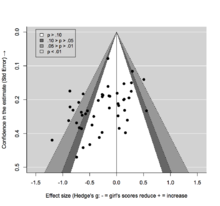| Established | 2012; 13 years ago (2012) |
|---|---|
| Parent institution | Tilburg University |
| Location | Tilburg, Netherlands |
| Website | metaresearch |
The Meta-Research Center at Tilburg University is a metascience research center within the School of Social and Behavioral Sciences at the Dutch Tilburg University. They were profiled in a September 2018 article in Science.
Research

Meta-research aims to improve reproducibility by studying how science is practiced and published and developing better ways for the scientific community to operate.
The research institute has published a large statistical meta-analysis of studies on the effect of Stereotype threat on girls' mathematics performance. They also use methods for estimating publication bias.
The research institute has developed an R based software tool called Statcheck that can detect incorrect statistical methods used in research articles. A large amount of statistical errors were detected in a sample of 50 000 psychology research articles. The use of it was perceived negatively by some of the researchers. The data mining practices of the research center have been in conflict with the policies of scientific publisher Elsevier.
A scientific misconduct case in the field of social psychology at Tilburg University has been a contributing factor in establishing the research center.
Advocacy
The research center makes recommendations for other researchers about how to avoid publication bias and to improve the statistical strength of results. They have stated support for pre-registration of studies and open sharing of research data.
See also
- Meta-research
- Scientometrics
- Addressing the replication crisis
- List of metascience research centers and organisations
References
- Stokstad, Erik (2018). "The truth squad". Science. 361 (6408): 1189–1191. Bibcode:2018Sci...361.1189S. doi:10.1126/science.361.6408.1189. ISSN 0036-8075. PMID 30237339.
- ^ Flore, Paulette C.; Wicherts, Jelte M. (2014). "Does stereotype threat influence performance of girls in stereotyped domains? A meta-analysis". Journal of School Psychology. 53 (1): 25–44. doi:10.1016/j.jsp.2014.10.002. ISSN 0022-4405. PMID 25636259.
- Nuijten, Michèle B.; Hartgerink, Chris H. J.; Van Assen, Marcel A. L. M.; Epskamp, Sacha; Wicherts, Jelte M. (2015). "The prevalence of statistical reporting errors in psychology (1985–2013)". Behavior Research Methods. 48 (4): 1205–1226. doi:10.3758/s13428-015-0664-2. PMC 5101263. PMID 26497820.
- ^ Buranyi, Stephen (2017-02-01). "The high-tech war on science fraud". the Guardian. Retrieved 2017-02-22.
- ^ Monya Baker (2015-10-28). "Smart software spots statistical errors in psychology papers". Nature News & Comment. doi:10.1038/nature.2015.18657. Retrieved 2017-02-25.
- Buranyi, Stephen (2016-09-05). "Scientists Are Worried About 'Peer Review by Algorithm' - Motherboard". motherboard.vice.com. Retrieved 2017-02-24.
- Jozien Wijkhuis (2015-11-23). "PhD student stops research because of Elsevier conflict | Univers". Univers. The Independent News Website of Tilburg University. Retrieved 2017-02-25.
External links
- "Meta-Research Center". Retrieved 2017-02-22.
School of Social and Behavioral Sciences